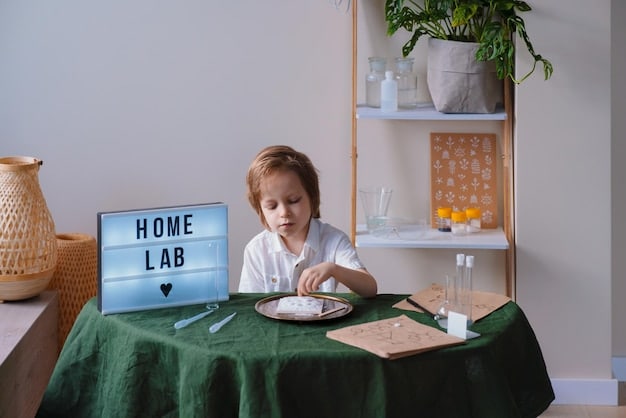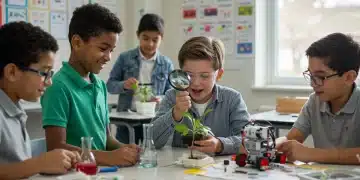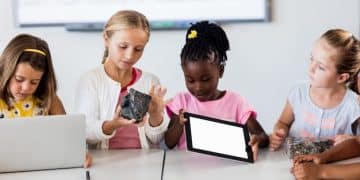Latest Homeschooling Trends: Alternative Education Models in 2025

Homeschooling and alternative education are evolving rapidly, with current trends including personalized learning paths, increased use of technology, a focus on social-emotional development, and the integration of community resources to provide a well-rounded educational experience.
The educational landscape is constantly shifting, and the realm of homeschooling and alternative education models is no exception. Let’s explore what are the latest trends in homeschooling and alternative education models? to understand how families are shaping the future of learning.
Understanding the Rising Popularity of Homeschooling
Homeschooling has experienced a surge in popularity in recent years, driven by various factors ranging from concerns about traditional school environments to a desire for more personalized educational experiences. This rise reflects a broader trend towards customized learning solutions that cater to individual student needs.
Why are Families Choosing Homeschooling?
Many families are drawn to the flexibility that homeschooling offers. It allows parents to tailor the curriculum to their child’s specific interests and learning style, creating a more engaging and effective educational journey.
- Personalized Education: Tailoring curriculum to fit individual learning styles and interests.
- Flexibility: Homeschooling allows families to set their own schedules and learn at their own pace.
- Safety Concerns: Some parents opt for homeschooling due to concerns about bullying or school safety.
- Values and Beliefs: The ability to integrate specific values and beliefs into the educational experience.
Moreover, homeschooling enables parents to create a learning environment that aligns with their values and beliefs. This can be particularly appealing for families seeking a more holistic approach to education that encompasses character development and moral instruction.

Technology Integration in Homeschooling
Technology has revolutionized homeschooling, providing access to a wealth of resources and tools that were once unimaginable. From online courses and virtual field trips to educational apps and interactive platforms, technology is enhancing the homeschooling experience in numerous ways.
The integration of technology not only expands learning opportunities but also equips students with essential digital literacy skills. These skills are crucial for success in today’s technology-driven world.
Benefits of Using Technology in Homeschooling
Online learning platforms offer structured courses, interactive lessons, and virtual classrooms that can supplement or even replace traditional textbooks. These platforms often provide assessments and progress tracking tools, enabling parents to monitor their child’s academic growth.
- Access to Diverse Resources: Online libraries, virtual field trips, and educational apps.
- Interactive Learning: Engaging educational games and simulations.
- Skill Development: Enhancing digital literacy and online collaboration skills.
- Personalized Learning Paths: Adaptive learning platforms that adjust to the student’s pace.
Additionally, technology facilitates collaboration and social interaction among homeschooled students. Online forums, virtual clubs, and collaborative projects allow children to connect with peers who share similar interests, fostering a sense of community and camaraderie.
The Rise of Unschooling and Self-Directed Learning
Unschooling, a philosophy that prioritizes self-directed learning and experiential education, is gaining traction within the homeschooling community. This approach emphasizes following the child’s interests and allowing them to learn through real-life experiences, rather than adhering to a structured curriculum.
Self-directed learning empowers students to take ownership of their education, fostering intrinsic motivation and a lifelong love of learning.
Key Principles of Unschooling
Unschooling is rooted in the belief that children are natural learners and that they will acquire knowledge and skills organically when given the freedom to explore their passions. This approach often involves a blend of informal learning activities, such as reading, playing, and engaging in hobbies, as well as more structured learning experiences, such as workshops, classes, and internships.

Focus on Social and Emotional Development
Homeschooling is no longer solely focused on academic achievement. There’s a growing emphasis on fostering social and emotional development in homeschooled children. Parents are actively seeking opportunities for their children to interact with peers, develop social skills, and build emotional resilience.
Recognizing the importance of social-emotional learning (SEL), many homeschooling families are incorporating activities and resources that promote empathy, communication, and conflict resolution.
Creating Social Opportunities for Homeschoolers
Homeschooling co-ops, support groups, and extracurricular activities provide avenues for homeschooled children to connect with peers and participate in social experiences. These settings offer opportunities for children to collaborate on projects, engage in group activities, and develop meaningful relationships.
- Homeschool Co-ops: Collaborative learning environments with shared teaching responsibilities.
- Extracurricular Activities: Sports teams, music lessons, and art classes.
- Community Involvement: Volunteering and participating in local events.
- Online Communities: Virtual forums and social groups tailored for homeschoolers.
Furthermore, involvement in community service projects allows homeschooled children to develop a sense of social responsibility and contribute to the well-being of their communities.
Micro-Schools and Hybrid Learning Models
Micro-schools and hybrid learning models are emerging as innovative alternatives to traditional homeschooling. These models combine the best aspects of homeschooling and traditional schooling, offering a blend of personalized learning and social interaction.
What are Micro-Schools?
Micro-schools are small, intimate learning environments that typically involve a small group of students and a dedicated teacher or facilitator. These schools often offer a customized curriculum and a focus on individualized attention, creating a nurturing and supportive learning community.
Micro-schools often incorporate project-based learning, inquiry-based learning, and other innovative teaching methods that encourage student engagement and critical thinking.
Hybrid Learning Approaches
Hybrid learning models blend homeschooling with traditional schooling. Students may attend classes at a school or learning center for a few days a week and homeschool for the remainder of the time. This approach offers a balance between personalized learning and social interaction.
- Balance: Combining home-based learning with classroom instruction.
- Flexibility: Tailoring the learning schedule to fit individual needs.
- Access to Resources: Utilizing school facilities and resources.
- Socialization: Engaging with peers in a structured environment.
Focus on Real-World Application and Experiential Learning
A significant trend in homeschooling involves a greater emphasis on real-world application and experiential learning. Parents are increasingly seeking ways to connect academic concepts to practical experiences, making learning more relevant and engaging for their children.
Hands-on activities, field trips, and internships are becoming integral components of the homeschooling curriculum.
Integrating Real-World Experiences into Homeschooling
Experiential learning involves learning through doing. This can include activities such as conducting science experiments, building models, creating art projects, and participating in simulations. These experiences allow students to apply their knowledge in meaningful ways.
- Hands-on Projects: Building, creating, and experimenting.
- Field Trips: Visiting museums, historical sites, and nature centers.
- Internships: Gaining real-world work experience.
- Community Service: Applying skills to benefit the community.
Through involvement in real-world experiences, homeschooled students develop critical thinking skills, problem-solving abilities, and a deeper understanding of the world around them.
| Key Point | Brief Description |
|---|---|
| 💡 Personalized Learning | Curriculum tailored to individual interests and learning styles. |
| 💻 Tech Integration | Use of online resources, apps, and virtual classrooms. |
| 🌱 SEL Focus | Emphasis on social and emotional learning. |
| 🌍 Real-World Learning | Hands-on activities and practical experiences. |
Frequently Asked Questions
▼
Homeschooling offers personalized learning, flexibility in scheduling, and the ability to tailor education to specific values and beliefs.
▼
Technology provides access to diverse resources, interactive learning tools, and opportunities for online collaboration and skill development.
▼
Unschooling is a philosophy that prioritizes self-directed learning through real-life experiences and following the child’s interests.
▼
Homeschoolers can participate in co-ops, extracurricular activities, community service, and online communities to develop social skills.
▼
Micro-schools are small, intimate learning environments that offer customized curriculum and individualized attention in a supportive community.
Conclusion
As we look to the future, the trends in homeschooling and alternative education models point towards a more personalized, flexible, and holistic approach to learning, empowering students to thrive in an ever-evolving world.





